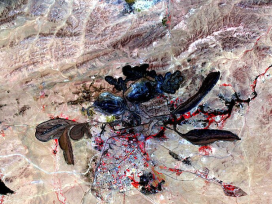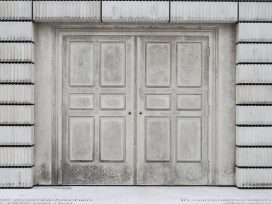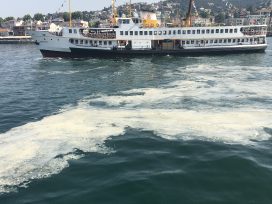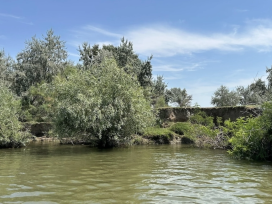Europe poops in its own nest
From the English Channel to the Sea of Marmara, Europe’s seas are soaked in sewage. It might not be the best topic for polite conversation, but managing human waste is the single most important urban necessity – and that’s why we’re talking all about it on the Earth Day episode of Standard Time, premiering at 7 PM CET.
The universal experience of excretion has been with us for millennia, yet the topic is considered taboo in many cultures. Though some people are attempting to confront the feelings of shame that come up when talking about it, we still have quite a long way to go, and no time to waste.
Speaking of waste: the release of untreated urban wastewater poses a real threat to the environment and subjects local communities to pollution. As it stands today, Europe’s two opposite shores are both soaked in it.
The picturesque Sea of Marmara has been suffocating under Istanbul’s untreated and undetreated sewage since the 1980s. In his European Press Prize nominated article for Eurozine, ‘An ode to Marmara’, Kaya Genc tracked the ensuing phytoplankton outbreaks, colloquially called the ‘sea snot crisis’, which has led to fish species populations dropping from 127 different species in 1915, to only 20 in 2010.
Following Brexit, the UK has let loose on environmental standards to protect marine and human health, by dumping sewage straight into the English Channel and North Sea. On average, there are 825 spills into its waterways per day.
Clean water and sanitation are the 6th Sustainable Developmental Goal the EU is addressing, but there are major differences between member states in how they handle their shit. According to the WHO in the European region, ‘more than 36 million people lack access to basic sanitation services…’ and this access is extremely unequal.
In urban areas, access to public toilets is often severely restricted, and the right to basic hygiene weighs down on poor and unhoused people. Tessza Udvarhelyi writes about how governments want to create the ‘ideal of the clean city’ for tourists, resulting in poor and racialized minorities being pushed to the margins of it. This form of urban segregation is mainly informed by the dogma of ‘cleanliness’, rooted in the 18th century.
Moreover, ever since France’s decision to dismantle the so-called ‘Calais Jungle’ camps in 2016, human rights experts have been urging the country to provide asylum seekers living there with safe water and sanitation.
However, draining sewage is only one half of the problem. Treating wastewated is wholly another, and a gigantic task at that. Of course, the waste that goes down the drains contains a lot of contaminants and toxins – but it could also be a resource. New technologies are attempting to address this problem, sometimes by rethinking very old methodologies, such as plant filtering and composting regimes.
Though composting and using urban waste as fertilizer is proposed as a sustainable solution, there is a reluctance to use it due to the toxic materials and chemicals found in it. But as Kate Brown puts it in her article for Estonian journal Vikerkaar on Resurrecting the soil: ‘If people realize that what they flushed down the toilet comes back to them on their dinner plates, then they might be more thoughtful both about what they consume and toss down the drain.’
So poop contains multitudes: pathogens and nutrients, human rights issues, industrial challenges, and more.
Today’s guests
Éva Tessza Udvarhelyi is an anthropologist and environmental psychologist. She is the co-founder of the School of Public Life, a grassroots civic education initiative dedicated to building a democratic and just Hungary. She is also the co-founder of a grassroots housing advocacy group called The City is for All, which has been mobilizing homeless people and their allies for housing rights. Until very recently, Tessza was the Head of the Office of Community Participation at the Municipality of the 8th District of Budapest, and now she runs the campaign of an independent candidate for district mayor.
Attila György Bodnár is an architect, entrepreneur, and executive vice president of Organica Water; a company that offers cost and space-efficient botanical garden-like solutions for wastewater treatment. Its mission is to show the world that wastewater treatment can be safe and aesthetically pleasing, while also making the world a more sutanainable place.
Vince Bakos is a biochemical engineer and assistant professor at the Budapest University of Technology and Economics. He specializes in wastewater management and environmental biotechnology.
We meet with them at Közben Stúdió in Budapest.
Creative team
Réka Kinga Papp, editor-in-chief
Merve Akyel, art director
Szilvia Pintér, producer
Zsófia Gabriella Papp, executive producer
Salma Shaka, writer-editor
Priyanka Hutschenreiter, project assistant
Management
Hermann Riessner, managing director
Judit Csikós, project manager
Csilla Nagyné Kardos, office administration
Video Crew Budapest
Nóra Ruszkai, sound engineering
Gergely Áron Pápai, photography
László Halász, photography
Postproduction
Nóra Ruszkai, lead video editor
István Nagy, video editor
Milán Golovics, conversation editor
Art
Victor Maria Lima, animation
Cornelia Frischauf, theme music
Captions and subtitles
Julia Sobota closed captions, Polish and French subtitles; language versions management
Farah Ayyash Arabic subtitles
Mia Belén Soriano Spanish subtitles
Marta Ferdebar Croatian subtitles
Lídia Nádori German subtitles
Katalin Szlukovényi Hungarian subtitles
Daniela Univazo German subtitles
Olena Yermakova Ukrainian subtitles
Aida Yermekbayeva Russian subtitles
Mars Zaslavsky Italian subtitles
Related reads
Kate Brown’s Resurrecting the soil, Eurozine article from Estonian partner journal Vikerkaar
An ode to Marmara, Kaya Genç’s European Press Prize nominated article from Eurozine
The Dirty Residents of a Clean City by Éva Tessza Udvarhelyi and Ágnes Török. Anthropology News. February: 60.
Sources
Break the taboo with poo, Nature Reviews Gastroenterology & Hepatology volume.
UK sewage turning Channel and North Sea into dumping ground, say French MEPs, The Guardian.
Addressing sanitation challenges in the European Region, World Health Organization.
UN rights experts urge France to provide safe water, sanitation for migrants in ‘Calais Jungle’, UN Refugees Migrants.
Disclosure
This talk show is a Display Europe production: a ground-breaking media platform anchored in public values.
This programme is co-funded by the Creative Europe Programme of the European Union and the European Cultural Foundation.
Importantly, the views and opinions expressed here are those of the authors and speakers only and do not necessarily reflect those of the European Union or the European Education and Culture Executive Agency (EACEA). Neither the European Union nor the EACEA can be held responsible for them.

Published 18 April 2024
Original in English
First published by Eurozine
© Standard Time / Eurozine / Display Europe
PDF/PRINTNewsletter
Subscribe to know what’s worth thinking about.
Related Articles

Excitement over ‘rare’ elements
Julie Klinger in conversation with Misha Glenny
The race for green transition supplies is on. But where’s the thrill in metals, discreet and hidden yet widespread? Mining, intensive due to low concentrations, throws up waste elements like arsenic. Space cowboys and deep-sea dredgers contest environmental stability more than China’s monopoly, based on 40-years of involved processing. Health and recycling regulations are a must.

Europe and its victims
Beyond the myth of national sovereignty
Europe has learnt the need to protect human dignity as inviolable, refuting the myth of national sovereignty and ethnically-based citizenship. But it also embraces these principles as forms of emancipation for Jews and previously colonized nations. This inconsistency endangers both Europe and its past victims.






